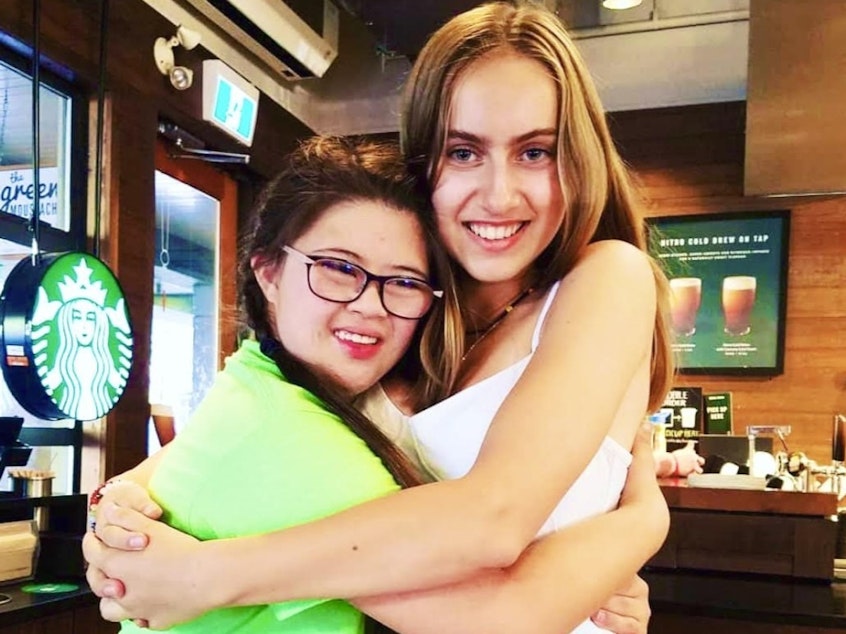Seeing people like herself changed this Seattle teen’s life

Mia Crump is a musically talented teen determined to claim her space in the music industry, despite not seeing herself and other people with disabilities represented in it.
Her friend since middle school, Lily Turner, shares Mia’s story of determination for making and playing music.
[RadioActive Youth Media is KUOW's radio journalism and audio storytelling program for young people. This episode was entirely youth-produced, from the writing to the audio editing.]
I
met Mia in the sixth grade, and throughout the past six years we’ve stayed close friends. Together we've navigated the horrors of middle school and the challenges that two disabled teen girls face in high school.
In my earliest memory of Mia we are 12 and singing. Mia has always been tangled in music and I, ever since I was little, have loved nothing more than good lyrics.
Mia Crump playing piano
Listen to a short clip of Mia playing music on her piano at home
I’ve noticed that, with my other disabled friends, music is always something that ties us together. And for Mia, that’s especially true.
“Sometimes it can be quite hard to say how I feel,” Mia tells me. “If I put it in a song, it can release the happiness or angriness that’s really been holding in and just let it out, and singing makes it easier for me,”
For me, music has been a hobby, my way of filling silence during every bus ride to school. But for Mia, music has been her life.
Mia has been a musician for seven years. She plays the piano, and has also played a bit of drums and a bit of guitar. Mia frequently performs for Best Buddies, an organization she is an ambassador for, as well as with a band she created called The Growing Up.
I am hard of hearing and Mia has Down syndrome. Mia and I aren’t who you typically see listening to, or creating, music. For a while this bothered Mia, and she grew self conscious before performances because she worried that “other people might laugh at you.”
She developed a tainted perspective of herself, and says she'd go around telling herself, “I suck.” She convinced herself she wasn’t good enough.
Mia even reached a point where she wanted to stop making music.
But the Mia that I know now has come a long way since those days of self doubt. So how did she pull herself out of this spiral of negativity?
“I think my biggest inspiration is Chris Nikic. Chris Nikic is very famous in my eyes,” she says.
Chris is an athlete. He’s the first person with Down syndrome to complete an Ironman Triathlon. Mia went to Hawaii and saw him compete and says she’s very proud of him.
It helped Mia to see someone who may have experienced what she experiences. Seeing them do it, you know you can too.
I was moved to hear this and thought back to my own struggle to find role models with my disability. While I can’t fully understand Mia’s experience, when it comes to positive portrayals of people with any disabilities, the cases are very minimal.
Both Mia and I want to change this. Mia spends hours making YouTube videos and Instagram posts titled “How special Down syndrome people can be” while working on her music career.
While I sit at my desk staring at the various KUOW stickers and tabs I have open, I think about how much it would have meant to me three years ago to hear someone like me on the radio, perhaps it would have saved me a lot of self doubt and hatred. Maybe it could have inspired me like Chris has inspired Mia.

I look forward to seeing where our futures take us, and I know for Mia that whatever path she chooses, music will always be woven within her.
“Music has totally changed me and my life,” Mia says.
This story was created in KUOW's RadioActive Online Intro to Radio Journalism Workshop for 15- to 18-year-olds, with production support from Simone St. Pierre Nelson and Antonio Nevarez. Prepared for the web by Antonio Nevarez. Edited by Ann Kane. Consultation support by Kayla Brown.
Find RadioActive on Facebook, Twitter, Instagram, TikTok, and on the RadioActive podcast.
Support for KUOW's RadioActive comes from the Bill & Melinda Gates Foundation Discovery Center.
If you have any feedback on this story, you can email RadioActive at radioactive@kuow.org or fill out the box below. Reach out. We're listening.



